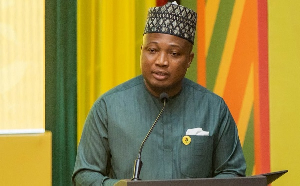Eric Bortey, Accra Metropolitan Director of the National Commission For Civic Education (NCCE) on Thursday cautioned civil society not to be complacent about the looming threat to constitutional rule.
"People who think there is no turning back should rethink", referring to issues like poverty, illiteracy, disease, tribal wars, corruption, mismanagement, nepotism, religious and political intolerance, which he said were major threats to democratic governance.
"There may still be red herrings in the security services that cannot pay the school fees of their children and can put their lives on the line," he said at a symposium organised by the NCCE to wrap up activities marking the third annual Constitution Week in the Metropolis.
He expressed the need for the sensitisation of the citizenry to appreciate the fact that a developing economy like Ghana could not meet all its aspirations.
"The theme for this year's celebration: 'A Decade Of Constitutionalism -Strategies For Consolidation' is very appropriate not only because it offers the opportunity for a comprehensive assessment of 10 years of constitutionalism in Ghana, but also because it is an opportunity for all Ghanaians to resolve to further entrench democracy," he stressed.
Bortey said although the NCCE had come under public criticisms for the zeal with which it was carrying out its official mandate, the Accra Metro Office managed to organise 230 civic and public education programmes in 190 communities with a meagre budget, last year.
He said only ?1.7m was released during the period under review for civic education for a population of about three million. "No NCCE office in the country was ever given any money to organise public education during the recent bye-elections. "Only 400,000 cedis is made available to each NCCE District office for the District Assembly elections and an imprest of ?100,000 each every month to run our offices when in the Accra office alone we spend ?780,000 for newspapers alone."
Kwesi Pratt (JNR), Managing Editor of "The Insight" called on civil society to be wary of people fanning ethnic sentiments to achieve their parochial interests.
Speaking on: "The Responsibility Of Civil Society To Guard And Entrench Constitutionalism In Ghana," he expressed amazement how people arrived at the conclusion that the Rawlings' Administration was Ewe inclined while the present Administration was pro-Ashanti.
He said it was only politicians, who had no answers to the development needs of the country who resorted to ethnicity, which would eventually have serious repercussions, especially for the less privileged in society.
Pratt said the most important consideration of Ghanaians should be leaders, who had the capability to provide them with three square meals a day, access to health care and social amenities. He said Journalists, who focused on ethnicity and other trivial matters by giving political twist to their stories were undermining national cohesion.
Pratt said there was the need for absolute tolerance for differences in opinion, but explained that such differences should not degenerate into conflicts. He said the rule of law by itself could not be the panacea to social injustice and called on Ghanaians to be outspoken against any form of abuse and to resist policies likely to undermine the interest of the nation.
Mrs Doris Acheampong, Greater Accra Regional Director of NCCE, who chaired the function, expressed the need for the NCCE to strive to redeem its low public image.
General News of Friday, 23 May 2003
Source: gna












